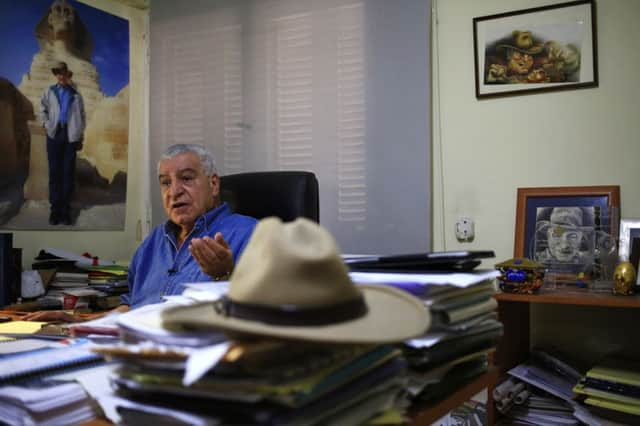Egypt’s ‘Indian Jones’ dreams of new museum


But four years after the uprising that toppled President Hosni Mubarak and nearly ended his own career, Zahi Hawass can be found in a cramped Cairo office, lamenting the state of the antiquities bureaucracy he once ruled like a pharaoh and dreaming of a new museum whose fate lies in limbo. His trademark wide-brimmed hat and safari vest may be hung up for now, but he is brimming with ideas on how to revive Egypt’s antiquities and bring back tourists after years of unrest.
A long-planned new facility out by the pyramids, called the Grand Egyptian Museum, was intended to open this year, but the government says it is short the $1 billion (£637,000) needed to complete the project.
Advertisement
Hide AdAdvertisement
Hide Ad“Government routine cannot work for museums,” Mr Hawass said in an interview in his office, asserting that state bureaucracy is one of the main reasons the current Egyptian Museum has fallen into disrepair. For the new museum, “the directorship, the curatorship, it can be from America, from Germany, from England, from any place in the world. You need this museum to be international”.
He also says private, international sponsorship is needed.
“If you pay $10,000, I put your name, written on the wall of the museum. If you pay $100,000, I put your name on the facade of the museum. If you build a whole gallery, I will name (the gallery after you),” he said, adding that the government should announce that Egyptian monuments belong to the entire world, not just Egyptians.
As to the challenge of moving artifacts from the current museum in downtown Cairo over bumpy roads to the site of the new facility on the city’s outskirts, Mr Hawass says “any TV channel” would pick up the tab in return for exclusive rights to document the artifacts’ restoration and transport. “They will run in competition to do this,” he said.
Mr Hawass knows TV. He was once a staple on the Discovery Channel and had his own reality show on the History Channel called Chasing Mummies, the promo for which introduced him by saying: “100,000 years of history belong to one man…Only he holds the key to the world’s greatest ruins.”
The productions earned him droves of fans abroad but led to accusations of grandstanding in Egypt, where he was seen by many as a self-promoter who mistreated subordinates and abused his position for personal gain.
He lost his job as head of antiquities after the 2011 uprising and faced corruption charges, of which he was later cleared.
But his swashbuckling antics gave a boost to Egyptian archaeology, with fundraising efforts and international tours of King Tut artifacts generating tens of millions of dollars.